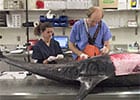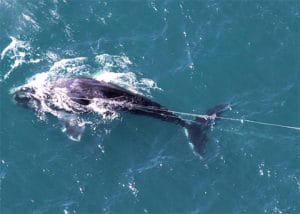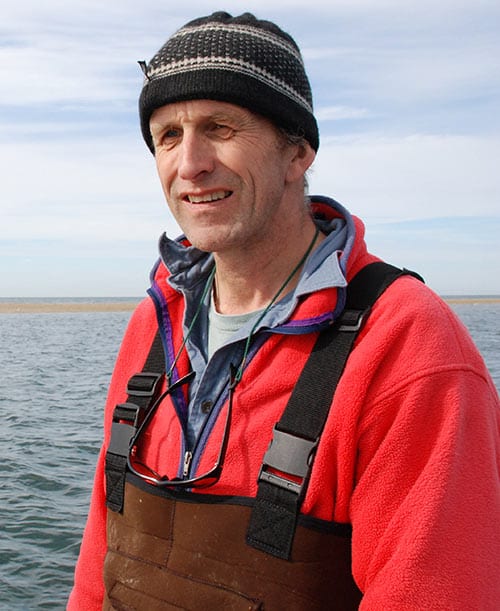Michael Moore
» Chasing Bayla: Michael Moore's quest to free a North Atlantic right whale from fishing gear (The Boston Globe, October 2014)
Michael Moore is one of a handful of marine biologists who works with the federal government to determine the cause of death for protected marine mammals. He has ongoing support for this work from the NOAA Marine Mammal Health and Stranding Response Program.
Although he works with many species of whales, Moore has devoted much of his career to understanding the endangered North Atlantic right whale, which are too often the victims of human activities. Since coming to WHOI as a graduate student in 1986, Moore has investigated why populations of North Atlantic right whales have not rebounded as they could have in the eight decades since whaling was outlawed, while their South Atlantic cousins have. Moore and colleagues at the New England Aquarium and elsewhere, as part of the Right Whale Consortium, have come to recognize that the specie lives mostly in a highly “urbanized” ocean, where ship strikes and fishing gear entanglements are a constant concern.
As a result, Moore has studied various pharmacological and mechanical tools to help restrain or sedate large whales so that they can be cut loose from ropes and fishing gear. These efforts include the development of methods of injecting large whales with sedatives or antibiotics. Moore and colleagues Becky Woodward and Jeremy Winn have also modeled the interactions between fixed fishing gear and large whale body parts and conducted engineering tests to determine how rope interacts with whale baleen.
In addition, Moore works with colleagues to understand the impact of ship strikes on whales. Using the lower jaw of the right whale as a test case, he and a graduate student, Regina Campbell-Malone, modeled the physical and material properties of blunt force collision between right whales and large ships. The project established a better understanding of how much (or how little) force it takes for a ship to kill a whale—data that could help policymakers set new guidelines about shipping lanes and speed limits.
Moore and graduate student Carolyn Miller have analyzed the reproductive health of the right whale. They undertook a study of blubber thickness in live right whales to investigate the hypothesis that low birth rates might be the result of malnourishment. In the process, they pioneered the use of non-invasive ultrasound devices suspended from a long carbon fiber pole. Moore and colleagues have found the North Atlantic right whales often carry significantly less fat stores than the South Atlantic whales, making pregnancy less likely.
In recent years he has worked with colleagues Alex Shorter at the University of Michigan, Doug Nowacek at Duke University Marine Laboratory, and Peter Tyack and Mark Johnson St. Andrews University in Scotland to study the effects of suction cup tags on dolphins and whales with support from the National Ocean Partnership Program. This work is in collaboration with his current MIT-WHOIgraduate student Julie van der Hoop. He also has a long-standing collaboration with Andreas Fahlman Texas A&M University Corpus Christi, who has an abiding interest in how diving mammals manage gas in the context of repetitive descents and ascents. This work has been supported by the Office of Naval Research. Van der Hoop, Moore, and others have also published important analyses of the efficacy of whale/ vessel strike mitigation measures, and the impact of the 2008 ship strike rule.
Moore has also maintained a long-term interest in the response of bottom fish to toxic pollutants. His doctoral thesis work focused on tumor formation in winter flounder associated with the Boston Harbor sewage outfall. He continues this work today, working with the Massachusetts Water Resources Authority Harbor and Outfall Monitoring Program.
Multimedia

Marine Mammals Meet Modern Medicine
To study whales, scientists use instruments designed for humans.

Video
Tangled Up in Fishing Gear
What scientists learned from a right whale named Eg 3911.
See Also
Michael Moore
Personal website
Study Examines How Diving Marine Mammals Manage Decompression
WHOI news release
Diving into the Right Whale Gene Pool
From Oceanus magazine
Doing the Right Thing for the Right Whale
From Oceanus magazine
Cumulative Sperm Whale Bone Damage and the Bends
WHOI news release
Mass Strandings Keep New Marine Mammal Facility Busy
From Oceanus magazine

